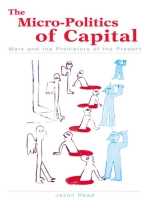Re-reads Marx in light of the contemporary critical interrogation of subjectivity.
What is the relation between the economy, or the mode of production, and culture, beliefs, and desires? How is it possible to think of these relations without reducing one to the other, or effacing one for the sake of the other? To answer these questions, The Micro-Politics of Capital re-reads Marx in light of the contemporary critical interrogations of subjectivity in the works of Althusser, Deleuze, Guattari, Foucault, and Negri. Jason Read suggests that what characterizes contemporary capitalism is the intimate intersection of the production of commodities with the production of desire, beliefs, and knowledge.
Cuprins
Introduction: There Is No Time Like the Present
1. The Use and Disadvantage of Prehistory for Life: Marx’s ‘Pre-Capitalist Economic Formations’ and the Constitution of the Subject of Labor
Primitive Accumulation
Immanent Causality
The Prehistory of Capitalism
Production
Antagonistic Logic (Part One)
2. What Is Living and What is Dead in the Philosophy of Karl Marx: The Politics and Ontology of Living Labor
Abstract Labor
Living Labor
Disciplinary Power
Antagonistic Logic (Part Two)
The Production of Subjectivity
3. The Real Subsumption of Subjectivity by Capital
Real Subsumption
The Fragment on Machines
Immaterial Labor
Subjectivity: From Reproduction to Production
The Common
Conclusion
Notes
Bibliography
Index
Despre autor
Jason Read is Assistant Professor of Philosophy at the University of Southern Maine.












